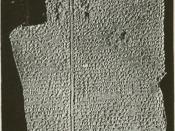The only thing life guarantees is death. Some accept death for what it is while others so foolishly try to avoid it. This notion is clearly depicted in the texts of Sappho and Gilgamesh. Both explore death, but only Sappho accepts it. She is fearless towards the unknown and is not fazed by the concept of death or decay. Gilgamesh on the other hand, tries to overcome death by voyaging through a fruitless journey to obtain immortality. However, in the end they only remain human and both perish. In comparing the texts of Gilgamesh and Sappho, it is evident that Sappho's acceptance of life (nature), focus on the here and now, and presence of love, makes her acceptance of death easier and much more bearable than that of Gilgamesh's.
The fact that Sappho accepts the principle of life and nature aids her in accepting death more freely and easily.
She allows nature to go on with its course without any objections. She harmonizes with nature's powerful force, which in turn proves to be a great benefit in that it dispels any reservations about the unknown. She is not afraid of change or getting old. To her, the process by which one ages and goes through life is beautiful. This is portrayed in her poem titled Age and Light, in the lines: "...yet I love refinement, and beauty and light are for me the same as desire for the sun." In this passage she clearly states that she loves minor alterations and sees them as being necessary and meaningful to a persons life just as the sun is. It seems that in a sense she longs for these alterations and longs for the beauty she feels. Therefore, she is not afraid of decay because she sees beauty in that...


